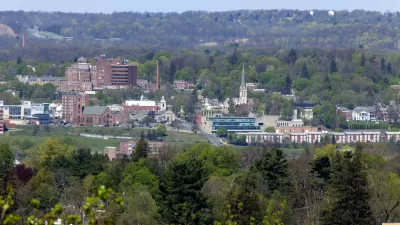With more cities banning the use of natural gas in new buildings, cooks are discovering the benefits of electric appliances.

As cities in California and around the country enact restrictions on natural gas in an effort to reduce emissions and fight climate change, cooks are—sometimes reluctantly—looking to electric appliances to replicate the traditional stove. But the transition isn't easy. As Evan Halper writes,
Swapping a gas clothes dryer, water heater or furnace for an electric one may not strike most consumers as a hefty sacrifice. But even some of the most progressive West Coasters bristle at the thought of giving up cooking with fire, with many home chefs recalling bad experiences with earlier electric stoves. The affinity Americans have for their gas stoves is the best hope many gas companies have for keeping customers hooked on their pipelines.
While the gas industry denies any health risks, experts say gas stoves have been shown to degrade indoor air quality and increase the risk of asthma in children. "A UCLA study funded by the Sierra Club raised similar alarms, finding unnervingly elevated rates of nitrogen dioxide — a driver of asthma — in homes where gas stoves and ovens were in use without an exhaust fan running."
Halper describes the gas industry's efforts to push back on this messaging and fight natural gas bans. Meanwhile, electrification advocates are working to shift the emotional connection people have to cooking with fire. Halper compares it to the early days of electric vehicle adoption, "when embrace of Tesla roadsters by early adopters who could otherwise afford the finest combustion engine Porsche or Mercedes sparked a shift in consumer opinion."
FULL STORY: Clash of the kitchens: California leads the way in a new climate battleground

Planetizen Federal Action Tracker
A weekly monitor of how Trump’s orders and actions are impacting planners and planning in America.

Restaurant Patios Were a Pandemic Win — Why Were They so Hard to Keep?
Social distancing requirements and changes in travel patterns prompted cities to pilot new uses for street and sidewalk space. Then it got complicated.

Map: Where Senate Republicans Want to Sell Your Public Lands
For public land advocates, the Senate Republicans’ proposal to sell millions of acres of public land in the West is “the biggest fight of their careers.”

Maui's Vacation Rental Debate Turns Ugly
Verbal attacks, misinformation campaigns and fistfights plague a high-stakes debate to convert thousands of vacation rentals into long-term housing.

San Francisco Suspends Traffic Calming Amidst Record Deaths
Citing “a challenging fiscal landscape,” the city will cease the program on the heels of 42 traffic deaths, including 24 pedestrians.

California Homeless Arrests, Citations Spike After Ruling
An investigation reveals that anti-homeless actions increased up to 500% after Grants Pass v. Johnson — even in cities claiming no policy change.
Urban Design for Planners 1: Software Tools
This six-course series explores essential urban design concepts using open source software and equips planners with the tools they need to participate fully in the urban design process.
Planning for Universal Design
Learn the tools for implementing Universal Design in planning regulations.
Heyer Gruel & Associates PA
JM Goldson LLC
Custer County Colorado
City of Camden Redevelopment Agency
City of Astoria
Transportation Research & Education Center (TREC) at Portland State University
Camden Redevelopment Agency
City of Claremont
Municipality of Princeton (NJ)





























